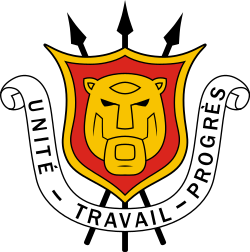National Assembly | |
|---|---|
 | |
| Type | |
| Type | of the Parliament of Burundi |
| History | |
| Founded | 1962 |
| Leadership | |
| Structure | |
| Seats | 100 directly elected, additional members co-opted to meet constitutional requirements [2] |
 | |
Political groups | |
Length of term | 5 years |
| Elections | |
| Closed list proportional representation with 2% electoral threshold | |
First election | 10 May 1965 |
Last election | 5 June 2025 |
Next election | July 2030 |
| Meeting place | |
 | |
| Kigobe Congress Center, Bujumbura | |
| Website | |
| www | |
 |
|---|
The National Assembly (Kirundi: Inama nshingamateka) is the lower chamber of Parliament in Burundi. It consists of 100 directly elected members (or deputies) and between 18 and 23 co-opted members who serve five-year terms. [3]
Contents
Deputies are elected in 5 multi-member constituencies using a party-list proportional representation system in accordance with the D'Hondt method. Political parties and lists of independent candidates must receive over 2% of the vote nationally to gain representation in the National Assembly.